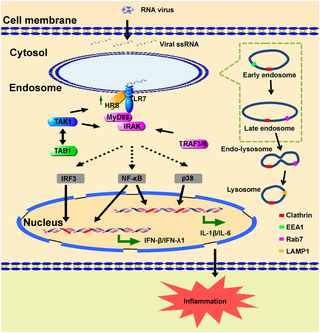PLoS Pathogens ( IF 6.7 ) Pub Date : 2017-08-30 , DOI: 10.1371/journal.ppat.1006585 Zhen Luo , Maolin Ge , Junbo Chen , Qibin Geng , Mingfu Tian , Zhi Qiao , Lan Bai , Qi Zhang , Chengliang Zhu , Ying Xiong , Kailang Wu , Fang Liu , Yingle Liu , Jianguo Wu

|
Enterovirus 71 (EV71) is an RNA virus that causes hand-foot-mouth disease (HFMD), and even fatal encephalitis in children. Although EV71 pathogenesis remains largely obscure, host immune responses may play important roles in the development of diseases. Recognition of pathogens mediated by Toll-like receptors (TLRs) induces host immune and inflammatory responses. Intracellular TLRs must traffic from the endoplasmic reticulum (ER) to the endolysosomal network from where they initiate complete signaling, leading to inflammatory response. This study reveals a novel mechanism underlying the regulation of TLR7 signaling during EV71 infection. Initially, we show that multiple cytokines are differentially expressed during viral infection and demonstrate that EV71 infection induces the production of proinflammatory cytokines through regulating TLR7-mediated p38 MAPK, and NF-κB signaling pathways. Further studies reveal that the expression of the endosome-associated protein hepatocyte growth factor-regulated tyrosine kinase substrate (HRS) is upregulated and highly correlated with the expression of TLR7 in EV71 infected patients, mice, and cultured cells. Virus-induced HRS subsequently enhances TLR7 complex formation in early- and late-endosome by interacting with TLR7 and TAB1. Moreover, HRS is involved in the regulation of the TLR7/NF-κB/p38 MAPK and the TLR7/NF-κB/IRF3 signaling pathways to induce proinflammatory cytokines and interferons, respectively, resulting in the orchestration of inflammatory and immune responses to the EV71 infection. Therefore, this study demonstrates that HRS acts as a key component of TLR7 signaling to orchestrate immune and inflammatory responses during EV71 infection, and provides new insights into the mechanisms underlying the regulation of host inflammation and innate immunity during EV71 infection.
中文翻译:

HRS对于TLR7信号在EV71感染后协调炎症和先天免疫起着重要作用
肠病毒71(EV71)是一种RNA病毒,可引起儿童手足口病(HFMD),甚至致命的脑炎。尽管EV71的发病机理仍然很模糊,但宿主的免疫反应可能在疾病的发展中起重要作用。识别由Toll样受体(TLR)介导的病原体会诱导宿主免疫和炎症反应。细胞内TLR必须从内质网(ER)传输到内溶酶体网络,并从中开始完整的信号传导,从而导致炎症反应。这项研究揭示了在EV71感染期间TLR7信号调节的潜在新机制。最初,我们显示病毒感染期间多种细胞因子差异表达,并证明EV71感染通过调节TLR7介导的p38 MAPK和NF-κB信号通路诱导促炎性细胞因子的产生。进一步的研究表明,在EV71感染的患者,小鼠和培养的细胞中,内体相关蛋白肝细胞生长因子调节的酪氨酸激酶底物(HRS)的表达上调,并且与TLR7的表达高度相关。病毒诱导的HRS随后通过与TLR7和TAB1相互作用增强了早期和晚期内体中TLR7复合物的形成。此外,HRS参与了TLR7 /NF-κB/ p38 MAPK和TLR7 /NF-κB/ IRF3信号通路的调节,分别诱导促炎性细胞因子和干扰素,导致对EV71感染的炎症和免疫反应进行编排。因此,这项研究表明,HRS是TLR7信号传导在EV71感染过程中协调免疫和炎症反应的关键组成部分,并为EV71感染过程中宿主炎症和先天免疫调节的潜在机制提供了新见解。



























 京公网安备 11010802027423号
京公网安备 11010802027423号